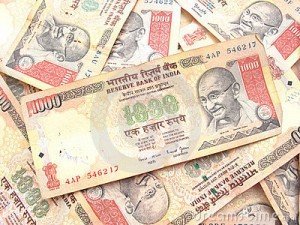The Indian rupee touched a new low of 52.63 versus the dollar. The free fall of the Indian rupee that was started in the later half of this year has seen the rupee weakening by almost 25%- a clear sign of troubled times ahead. But why is a depreciating rupee bad ?
If we examine the structure of the Indian economy we can clearly find that as a country we are a net importer of goods. This implies that we have a net trade deficit when it comes to our trading partners and in turn implies that a depreciating rupee versus the dollar is going to severely affect the balance sheet of the country. This comes at a time when the finance minister of India has said that a fiscal deficit of 5% will be hard to meet this year.
The fall of the Indian Rupee was started initially owing to the European debt crisis which led to withdrawing of foreign investment from the Indian market in order to manage the liquidity crisis in their markets. The markets all over the world crashed and the Indian stocks were no exception to the volatile situation. Ironically, a section of the Indian industrialists actually celebrated the fall of the rupee, particularly those whose major revenue came through foreign exchange. As these industries, namely IT sector and manufacturing sectors like apparel, rejoiced due to increase in profits in their balance sheet – another major crisis was underway.

Let us see how the situation is unfolding. Let A be a foreign investor investing in stock XYZ in the Indian stock market when the exchange rate was 1$=INR 45. The market value of stock XYZ at that moment was Rs. 90 per unit. Investor A decided to purchase 100 units of the stock at a total purchase of $200 ( INR 9000). Company XYZ posts good quarterly results and its shares start trading at INR 96. Do you think investor A should be happy ? Think again !
What actually happened also in the meantime was that rupee depreciated to INR 50 / USD. So while in terms of rupee investor A had a 6.67% increase, he actually incurred a loss. His investment was now worth 9600/50=$192 against his original investment of $200. So he actually incurs a loss of 4%. Do you think he will invest in the Indian stocks? In fact this has been one of the major reasons of stock market fluctuations in recent days as most investors are selling short and looking for intra – day gains.
Moreover manufacturing industries that depend heavily on imports are another loser in this sector. India as a country imports nearly 80% of its oil needs- so while the world oil prices are hovering in the region of $85-90 per barrel, much lower than $100 mark per barrel, the Indian consumer still ends up spending more- leading to a direct impact on double digit inflation rates.
The RBI has intervened in the past intervened by managing the exchange rate by either purchasing or selling dollar. In the current world economic crisis, however, almost every country is following the same RBI policy that was once ridiculed by the IMF as opposing the free market principle. The problem this time though is much larger to be solved just by managing the exchange rates. Perhaps, it is time world leaders should give serious thought to reversing President Nixon’s decision of discontinuing gold as reserve currency and bringing back the good old days of Tobin tax and Spahn tax.
You might like reading:
Analyzing ‘Organic Foods and Café’ as a Brand
How was the Brand built? Organic Foods and Café was founded by Nils El Accad in Dubai,UAE. The story begins when his mother gets ill with cancer and then shifted to organic and wholegrain foods which helped her a lot. Later Nils also was being poisoned by the food he ate (non organic) and doctors were unable to cure him. Later homeopath discovered it […]

Mobile Banking and M-pesa in Developing Countries
With the advent of technological innovation, life of mankind has changed significantly. Mobile phone is one such innovation that has brought all humans closer with their ability to talk, share and communicate. Now we have such a huge platform to connect with each other and this platform can be further used in several other areas. One such use is Mobile […]






























